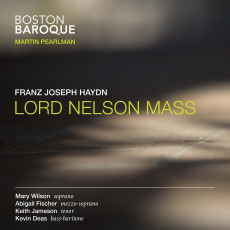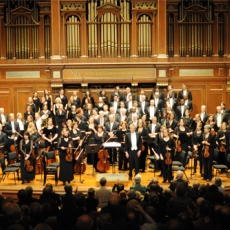Boston Baroque - Haydn: Lord Nelson Mass - International Record Review
Writing in the summer of 1798, with Napoleon's armies knocking on Vienna's door, Haydn called his late masterpiece Missa in Angustiis (‘Mass in a Time of Anxiety'). That anxiety has never sounded more real or terrifying than in this new recording from Boston Baroque, recorded with palpable tension in the immediate aftermath of the April 2013 Boston Marathon terrorist bombing.
The ‘Kyrie' erupts from the speakers with a startling hard-sticked timpani thwack and punchy D minor orchestral chord (the same key of foreboding as in Don Giovanni, a work that made a big impression on Haydn when he encountered it at its Vienna premiere ten years earlier). Martin Pearlman and his driven Boston forces revel in Haydn's dark, turbulent, dangerous atmosphere. Menacing trumpet calls slice through the texture of urgent hyperactive strings and searingly intense monotone chorus. A gripping, unsettling experience, this performance leaves no doubt that the Mass is a product of wartime.
It's far from being all doom and gloom, however. Haydn composed the Mass while recovering from the exhaustion brought on by the stress of completing and performing The Creation earlier that year, and much of the radiant affability that contributed to the oratorio's massive success permeate the work. The sun first comes out at the start of the D Major ‘Gloria', and the Boston forces prove themselves equally comfortable and persuasive in Haydn's joyful music. Pearlman's brisk tempos ensure buoyancy and forward momentum, never at the expense of clarity.
The four vocal soloists blend well and take their individual spotlit moments with sensitivity and dexterity. Kevin Deas's smooth and focused bass provides solid grounding, and an impressive solo in the gentle aria-like ‘Qui Tollis'. At the top end, soprano Mary Wilson has rather a laser-like tone, but her admirably clear coloratura is a great asset in the spritely ‘Quoniam' and her opening phrase in the ethereal ‘Et incarnatus' is sensitively delivered.
Like The Creation, the Mass is primarily a choral work, and the well-drilled Boston Baroque Chorus clearly enjoys taking centre stage...its chamber proportions pay dividends in Haydn's nimble fugues, which it takes in its stride.
In a brutal cost-cutting measure (all too familiar to many arts organizations today) Haydn's patron Prince Nikolaus Esterházy had recently sacked all the horn and woodwind players from his court orchestra, but Haydn turns necessity to advantage with the Mass's distinctive, stark scoring, managing so adroitly with the reduced forces at his disposal that the absences are hardly noticed. A chamber organ often takes the role of woodwind, adding jovial continuo tootling to the texture and occasionally emerging with welcome solo spots such as the decorative solo line in the ‘Qui Tollis'. The Boston organ is well recorded and confidently played...
The Mass - which became known popularly as the ‘Lord Nelson Mass' around the time of its September 1798 premiere, when word reached Vienna that the British Admiral had destroyed Napoleon's fleet at Aboukir - is, like Mozart's Requiem, a masterful blend of old and new. Baroque austerity (the ‘Credo' begins with a powerful chorus in strict two-part canon) and even more ancient plainchant-infused passages sit easily alongside the modern virtuosity of lively violin parts and poignant operatic arias. Pearlman and his Boston forces demonstrate a strong affinity for all these styles, crafting a coherent whole. This is a thoroughly compelling account of this remarkable Mass. As with their 2011 version of The Creation (also on Linn, reviewed in September 2012), the recording places the listener very close to the action...
The coupling is a chance for the period-instrument band to shine, full wind and brass line-up restored, in one of Haydn's lesser-known but grandest ‘London' Symphonies, No. 102 in B-flat Major. I much suspect that the only reason for its relative neglect is the lack of a nickname, because it brims with at least as much joyousness, clever invention and appealing melodiousness as any of Haydn's best, superbly rendered in Pearlman's vibrant, idiomatic and fluent account.

